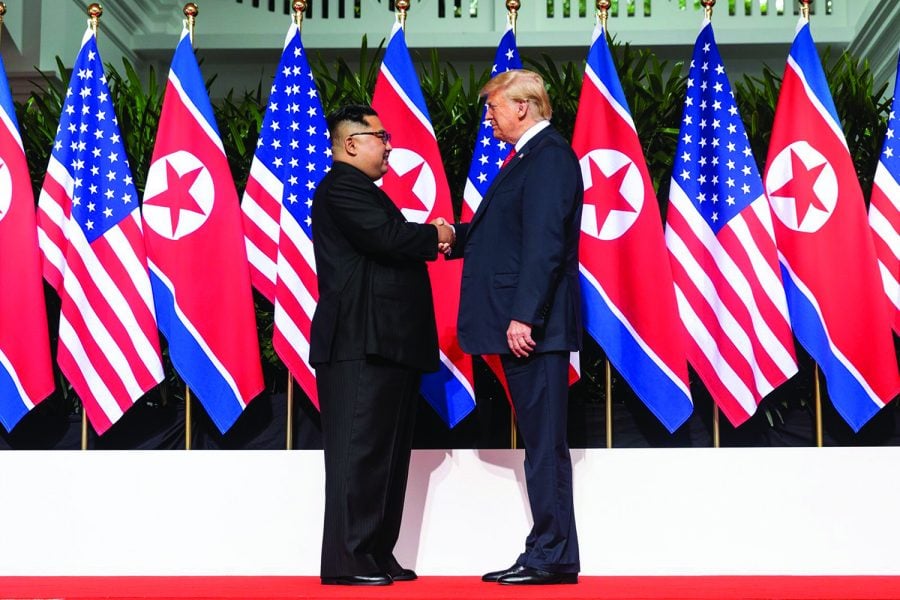Denuclearization stagnation cancels Pompeo trip
President Donald Trump shakes hands with North Korean Supreme Leader Kim Jong-un on June 12,, 2018, in Singapore. This is the first time a U.S. president has met with a North Korean ruler. // Photo courtesy of Wikimedia Commons
On August 24, President Donald Trump announced the cancellation of Secretary of State Mike Pompeo’s trip to North Korea, due to stagnation in denuclearization negotiations.
“I have asked Secretary of State Mike Pompeo not to go to North Korea, at this time because I feel we are not making sufficient progress with respect to the denuclearization of the Korean Peninsula,” said Trump.
Due to the U.S.’s involvement in a trade war with China, as well as the intransigence of North Korea and the U.S., negotiations have been stalemated since the original Singapore Summit.
In June, Kim Jong-Un and Trump met in Singapore to begin negotiations. The nuclear disarmament of North Korea was conditional on two things, according to Vox and CBS News. In order for continued progress in denuclearization, the U.S had to reduce economic sanctions and sign a peace declaration.
The Washington Post reported that the North Korean Foreign Ministry demanded a declaration to end the Korean War, before progress was made in denuclearization. However, the U.S. has insisted on steps being made toward nuclear disarmament before any concessions were made.
“North Korea has yet to embark on a discernible path toward denuclearization,” said Guilford Program Coordinator for the International Studies Department Eric Mortensen. “Then again, the U.S. has not eased its sanctions regime against North Korea.”
Neither side has been able to agree on what must be handled first, nor have they been able to compromise on the issue at hand.
However, Trump blames China for the stagnation at the negotiation tables instead of the two Nations’ inability to compromise.
“I do not believe they are helping with the process of denuclearization as they once were (despite the UN Sanctions which are in place),” said Trump in his tweet, when he announced the cancellation of Pompeo’s meeting.
China is North Korea’s main source of trade. Without China, North Korea would have “no food, no water, nothing, nothing, because 90 percent of their trade came from China.” said Guilford Professor of Political Science George Guo.
Due to U.S. engagement in a trade war with China, China is unlikely to cooperate with the U.S in these negotiations.
China has been trading “money, fuel, fertilizer and various other commodities,” with North Korea, according to a statement from the White House. As such, the U.S. sanctions don’t impact North Korea enough to consider denuclearization. Without China’s cooperation, the U.S. doesn’t have much economic leverage for nuclear disarmament.
Others hold the belief that negotiations were futile from the start.
“There was nothing tangible that came out of that meeting, other than they were gonna talk. I think it was a propaganda victory for Kim Jong-Un and North Korea.” said Guilford Professor of Political Science Ken Gilmore.
“Pompeo and Trump and others realize that Kim Jong-Un was not making progress and any meeting that they had would be as useless as the first one,” Gilmore stated.
“If there’s nothing concrete on the ground, not even a hint of denuclearization a month or two after the meeting, then it’s simply hot air on both sides,” said Early College student Le Bui. “It was a political victory for their support based on all sides.”
Whether the U.S.’s current impasse with North Korea is due trade with China, lack of compromise, or another reason, one thing is clear the cancellation of Pompeo’s trip is a signal to lack of progress. Unless something is to drastically change, the only North Korea the U.S. will be negotiating with is a nuclear one.










Helen tilley • Sep 12, 2018 at 4:34 pm
What a great article Grand Daughter I am so proud of you. Keep up great work.